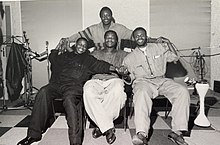| Soukous | |
|---|---|
 | |
| Stylistic origins | |
| Cultural origins | Late 1960s in DRC and Republic of the Congo, 1980s in France |
| Derivative forms | Muziki wa dansi and ndombolo |
| Regional scenes | |
| Congolese sound (Kenya, Uganda, Tanzania), fast-paced soukous (Paris) | |
| Other topics | |
| Soukous musicians | |
Soukous (from French secousse, "shock, jolt, jerk") is a genre of dance music originating from the Democratic Republic of the Congo (formerly Zaire) and the Republic of the Congo (formerly French Congo).[1] It derived from Congolese rumba in the 1960s, with faster dance rhythms and bright, intricate guitar improvisation,[2] and gained popularity in the 1980s in France.[3] Although often used by journalists as a synonym for Congolese rumba, both the music and dance associated with soukous differ from more traditional rumba, especially in its higher tempo, song structures and longer dance sequences.[3]
Soukous fuses traditional Congolese rhythms with contemporary instruments. It customarily incorporates electric guitars, double bass, congas, clips, and brass/woodwinds.[4][5] Soukous lyrics often explore themes of love, social commentary, amorous narratives, philosophical musings, and ordinary struggles and successes.[2] Singers occasionally sing and croon in Lingala, Kikongo, French and Swahili and bands often consist of a primary vocalist accompanied by several backing singers.[6][7]
- ^ Appiah, Anthony; Gates, Henry Louis (2010). Encyclopedia of Africa, Volume 1. Oxford, UK: Oxford University Press. pp. 407–408. ISBN 9780195337709.
- ^ a b Appiah, Anthony; Gates (Jr.), Henry Louis (2010). Encyclopedia of Africa. Oxford, United Kingdom: Oxford University Press. pp. 407–408. ISBN 978-0-19-533770-9.
- ^ a b Peek, Philip M.; Yankah, Kwesi (2004). African Folklore: An Encyclopedia. New York, NY: Routledge. p. 548. ISBN 9781135948733.
- ^ Davies, Carole Boyce (July 29, 2008). Encyclopedia of the African Diaspora [3 volumes]: Origins, Experiences, and Culture [3 volumes]. Santa Barbara, California: Bloomsbury Publishing USA. p. 849. ISBN 978-1-85109-705-0.
- ^ Domosh, Mona; Jordan-Bychkov, Terry G.; Neumann, Roderick P.; Price, Patricia L. (2012). The Human Mosaic. Macmillan. p. 416. ISBN 978-1-4292-7200-1.
- ^ Olwig, Karen Fog; Sorensen, Ninna Nyberg (August 27, 2003). Work and Migration: Life and Livelihoods in a Globalizing World. Oxfordshire, England, United Kingdom: Routledge. p. 56. ISBN 978-1-134-50306-3.
- ^ Russell, K.F. (1997). Rhythm Music Magazine: RMM. K.F. Russell. p. 45.